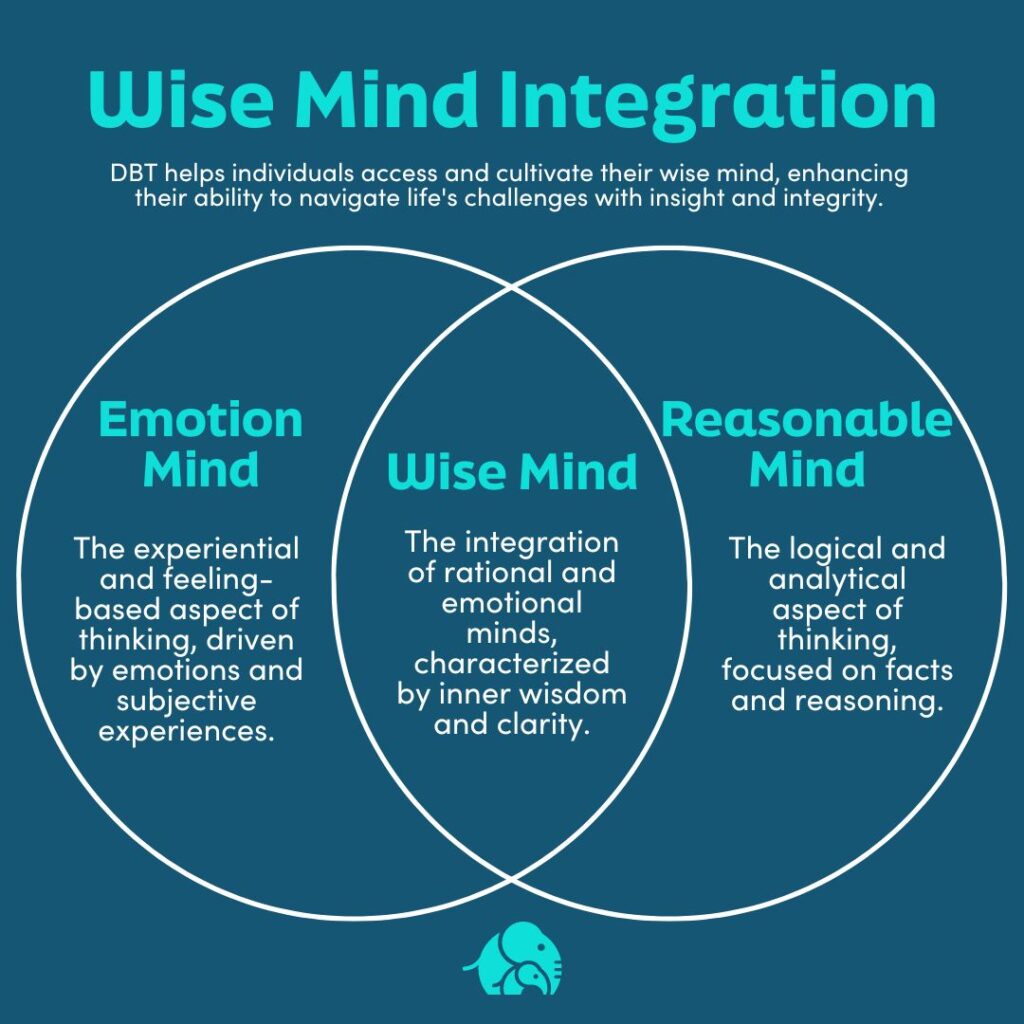Fully accepting ourselves as we are right now AND fully committing to changing ourselves for the better: that is the essence of DBT (Dialectical Behavior Therapy). A “dialectic” is an attempt to find the harmony between two seemingly contradictory ideas. In DBT, clients work to find this harmony between radical acceptance and change.
Here at Ellie, we pour our energy into providing evidence-based approaches that empower individuals to navigate life’s challenges with resilience and authenticity. DBT offers practical wisdom and profound insights, helping clients to move toward a richer and fuller life.
The Core Tenets of DBT:
- Mindfulness Mastery: At the heart of DBT lies the cultivation of mindfulness – the ability to be present and aware of one’s thoughts, feelings, and sensations without judgment. Through mindfulness practices, individuals develop a deeper understanding of themselves and their inner experiences, laying the groundwork for effective emotional regulation.
- Emotion Regulation: DBT equips individuals with the tools to identify, understand, and manage their emotions in healthy and adaptive ways. By learning to recognize emotional triggers, challenge unhelpful thought patterns, and cultivate coping strategies, individuals can navigate emotional turmoil with greater ease and resilience.
- Distress Tolerance: Life is filled with inevitable challenges and setbacks, but how we respond to adversity can significantly impact our well-being. DBT teaches individuals practical techniques for tolerating distress without resorting to destructive behaviors. Through acceptance and skillful coping strategies, individuals learn to navigate difficult situations with grace and resilience.
- Interpersonal Effectiveness: Healthy relationships are essential for our emotional and psychological health, yet navigating interpersonal dynamics can be complex. DBT provides individuals with tools for effective communication, boundary-setting, and conflict resolution, empowering them to cultivate and maintain meaningful connections with others.
- Wise Mind Integration: In DBT, the concept of wise mind, rational mind, and emotional mind plays a pivotal role in guiding individuals towards balanced decision-making and problem-solving.
- Wise Mind: The integration of rational and emotional minds, characterized by inner wisdom and clarity.
- Rational Mind: The logical and analytical aspect of thinking, focused on facts and reasoning.
- Emotional Mind: The experiential and feeling-based aspect of thinking, driven by emotions and subjective experiences.

Wise mind, the synthesis of rational and emotional minds, represents a state of inner wisdom and clarity. By integrating these three aspects of mind, individuals can make decisions that are both logical and emotionally resonant, leading to greater authenticity and alignment with personal values. Through mindfulness practices and cognitive restructuring, DBT helps individuals access and cultivate their wise mind, enhancing their ability to navigate life’s challenges with insight and integrity.
Are you ready to get started on your journey toward mental health and acceptance through therapy? Take the next step.
Who Might Benefit from DBT?
DBT is highly versatile and can be beneficial for individuals facing a wide range of mental health challenges. Some potential candidates for DBT therapy include:
- Those with Borderline Personality Disorder (BPD): DBT was originally developed as a treatment for BPD and has been shown to be highly effective in helping individuals manage symptoms such as emotional dysregulation, impulsivity, and unstable relationships.
- Those with mood disorders: DBT can be beneficial for individuals with mood disorders such as depression and bipolar disorder, helping them develop coping skills to manage intense emotions and reduce the risk of relapse.
- Those with anxiety disorders: DBT techniques, particularly mindfulness practices, can be helpful for individuals struggling with anxiety disorders, providing tools to manage worry, panic attacks, and other symptoms.
- Those with substance abuse issues: DBT has also been adapted for use in treating substance abuse disorders, helping individuals develop strategies to cope with cravings, manage triggers, and prevent relapse.
Different Types of DBT:
While standard DBT typically consists of individual therapy, group skills training, phone coaching, and therapist consultation teams, there are also variations of DBT that may be tailored to meet the unique needs of individuals:
- DBT Skills Groups: These groups focus specifically on teaching the core skills of mindfulness, emotion regulation, distress tolerance, and interpersonal effectiveness. They provide a supportive environment where individuals can learn and practice these skills with others facing similar challenges.
- DBT for Adolescents: Adaptations of DBT have been developed specifically for adolescents, addressing the unique developmental needs and challenges faced by this population. These programs may include family involvement and tailored interventions to support adolescents in developing skills for emotion regulation and interpersonal effectiveness.
- DBT for Couples: DBT principles can also be applied in couples therapy, helping partners communicate more effectively, manage conflicts, and navigate relationship challenges with greater understanding and compassion.
Integration with Other Therapies and Medications:
DBT can be used as a standalone therapy or in conjunction with other therapeutic modalities and medications, depending on the individual’s needs and preferences. It can complement traditional talk therapy approaches, such as cognitive-behavioral therapy (CBT) or psychodynamic therapy, by providing additional skills and strategies for managing emotions and interpersonal relationships.
For individuals receiving medication management for mental health conditions, DBT can enhance the effectiveness of medication by helping individuals develop coping skills to manage symptoms and improve overall functioning. Additionally, DBT may help individuals reduce reliance on medication over time as they learn to manage their symptoms more effectively through skillful coping strategies.
Learn more about how mental health medications work with therapy
DBT offers a versatile and comprehensive approach to mental health and emotional well-being, with applications across a wide range of populations and conditions. Whether used as a standalone therapy or in conjunction with other modalities, DBT provides individuals with practical tools and strategies for building resilience, fostering self-awareness, and cultivating meaningful connections with others.
Are you ready to get started on your journey toward mental health and acceptance through therapy? Take the next step.


